实验5
#include <stdio.h> #define N 4 int main() { int x[N]={1,9,8,4}; int i; int *p; for(i=0;i<N;i++) printf("%d",x[i]); printf("\n"); for(p=x;p<x+N;p++) printf("%d",*p); printf("\n"); p=x; for(i=0;i<N;i++) printf("%d",*(p+i)); printf("\n"); for(i=0;i<N;i++) printf("%d",p[i]); printf("\n"); return 0; }
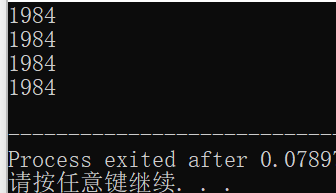
#include <stdio.h> int main() { int x[2][4]={{1,9,8,4},{2,0,4,9}}; int i,j; int *p; int (*q)[4]; //方法一: for(i=0;i<2;i++) { for(j=0;j<4;j++) printf("%d",x[i][j]); printf("\n"); } printf("\n\n"); //方法二: for(p=x[0],i=0;p<x[0]+2*4;p++,i++) { printf("%d",*p); if((i+1)%4==0) printf("\n"); } printf("\n\n"); //方法三: for(q=x;q<x+2;q++) { for(i=0;i<4;i++) printf("%d",*(*q+i)); printf("\n"); } }
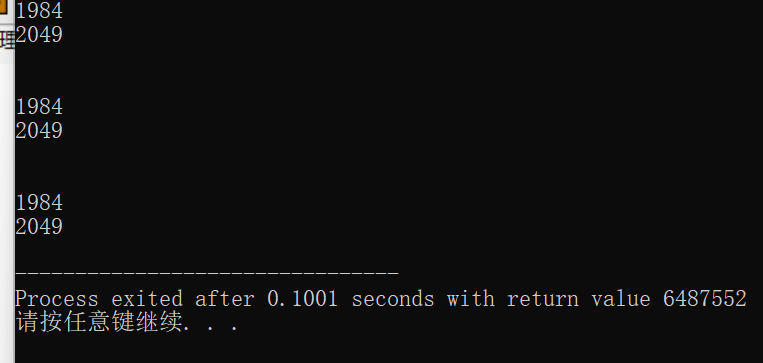
#include <stdio.h> #include <string.h> #define N 80 int main() { char s1[]="Learning makes me happy"; char s2[]="Learning makes me sleepy "; char tmp[N]; printf("sizeof(s1) vs strlen(s1):\n"); printf("sizeof(s1)=%d\n",sizeof(s1)); printf("strlen(s1)=%d\n",strlen(s1)); printf("\n before swap: \n"); printf("s1:%s\n",s1); printf("s2:%s\n",s2); printf("\n swapping...\n"); strcpy(tmp,s1); strcpy(s1,s2); strcpy(s2,tmp); printf("\n after swap:\n"); printf("s1:%s\n",s1); printf("s2:%s\n",s2); return 0; }
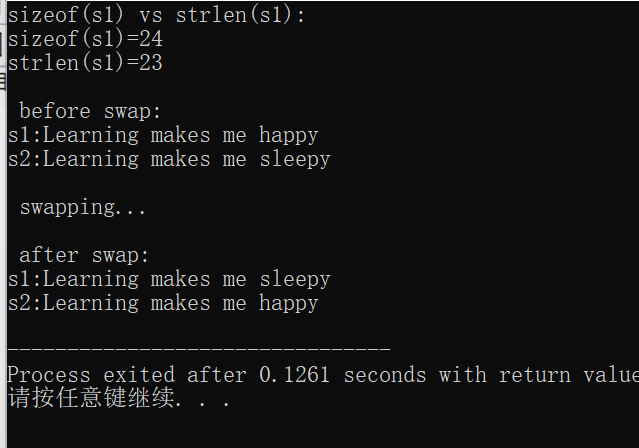
问题1:数组s1大小是24,sizeof计算的是数组的大小,即包含结束标记,strlen统计的是字符串实际长度,不包含结束标记。
问题2:不可以替换,s1是一个地址常量,不能对它赋值。
问题3:字符数组中内容实现了交换。
#include <stdio.h> #include <string.h> #define N 80 int main() { char *s1="Learning makes me happy"; char *s2="Learning makes me sleepy"; char *tmp; printf("sizeof(s1) vs strlen(s1):\n"); printf("sizeof(s1)=%d\n",sizeof(s1)); printf("strlen(s1)=%d\n",strlen(s1)); printf("\n before swap: \n"); printf("s1:%s\n",s1); printf("s2:%s\n",s2); printf("\n swapping...\n"); tmp=s1; s1=s2; s2=tmp; printf("\n after swap:\n"); printf("s1:%s\n",s1); printf("s2:%s\n",s2); return 0; }
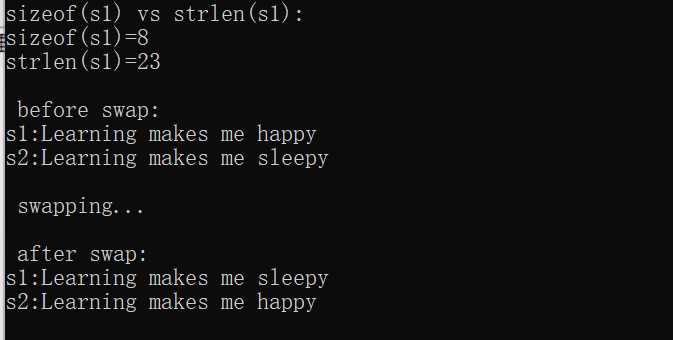
问题1:指针变量s1中存放的是字符串的起始地址,sizeof(s1)计算的是地址占用的内存空间,strlen统计的是指针s1所指向的字符串的实际大小
问题2:可以替换,这里的s1是一个指针变量,可以对它赋值,对比task2-1中,s1是一个常量,二者含义不同。
问题3:交换的是指针的指向,字符串的地址并未发生改变;
#include <stdio.h> void str_cpy(char *target,const char *source); void str_cat(char *str1,char *str2); int main() { char s1[80],s2[20]="1984"; str_cpy(s1,s2); printf("%s\n",s1); str_cat(s1,"hhahha"); puts(s1); return 0; } void str_cpy(char *target,const char *source) { char *p=target,*q=source; //while(*target++=*source++); while((*p=*q)!='\0') { p++; q++; } } void str_cat(char *str1, char *str2) { char *p=str1,*q=str2; //while(*str1) while(*p) // str++; { // p++; //while(*str1++ = *str2++); } // while((*p=*q)!='\0') { p++; q++; } }

#include <stdio.h> #define N 80 int func(char *); int main() { char str[80]; while(gets(str)!=NULL) if(func(str)) printf("yes\n\n"); else printf("no\n\n"); } int func(char *str) { char *begin,*end; begin=end=str; while(*end) end++; end--; while(begin<end) { if(*begin!=*end) return 0; end--; begin++; } return 1; }

#include <stdio.h> #define N 80 void func(char*); int main() { char s[N]; while(gets(s)!=NULL) { func(s); puts(s); } } void func(char *str) { char i,*p1,*p2,*p; p1=p2=p=str; while(*p1=='*') p1++; while(*p2) p2++; p2--; while(*p2=='*') p2--; i=0; while(p<p1) { str[i++]=*p; p++; } while(p<=p2) { if(*p!='*') str[i++]=*p; p++; } while(p>p2) { str[i++]=*p; p++; } }

#include <stdio.h> #include <stdlib.h> void sort(char *name[],int n); int main() { char *course[4]={"C Program", "C++ Program", "Operating System", "Data Structure and Algorithms"}; int i; sort(course,4); for(i=0;i<4;i++) printf("%s\n\n",course[i]); return 0; } void sort(char *name[],int n) { int i,j; char *tmp; for(i=0;i<n-1;i++) for(j=0;j<n-1-i;j++) { if(strcmp(name[j],name[j+1])>0) { tmp=name[j]; name[j]=name[j+1]; name[j+1]=tmp; } } }
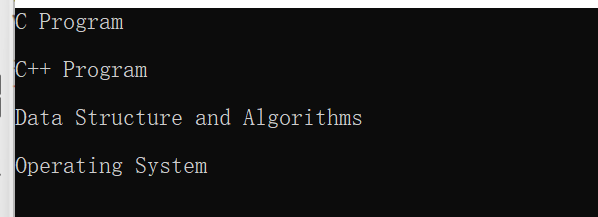
#include <stdio.h> #include <stdlib.h> void sort(char *name[],int n); int main() { char *course[4]={"C Program", "C++ Program", "Operating System", "Data Structure and Algorithms"}; int i; sort(course,4); for(i=0;i<4;i++) printf("%s\n\n",course[i]); return 0; } void sort(char *name[],int n) { int i,j,k; char *tmp; for(i=0;i<n-1;i++) { k=i; for(j=i+1;j<n;j++) { if(strcmp(name[j],name[k])<0) k=j; } if(k!=i) { tmp=name[i]; name[i]=name[k]; name[k]=tmp; } } }

问题:实现的是指针变量的值。
#include <stdio.h> #include <string.h> #define N 5 int check_id(char *str); int main() { char *pid[N] = {"31010120000721656X", "330106199609203301", "53010220051126571", "510104199211197977", "53010220051126133Y"}; int i; for (i = 0; i < N; ++i) if (check_id(pid[i])) // 函数调用 printf("%s\tTrue\n", pid[i]); else printf("%s\tFalse\n", pid[i]); return 0; } int check_id(char *str) { int flag=1; char *p=str; for(p=str;*p!='\0';p++) { flag=1; if(str[17]!='X'&&(*p<48||*p>57)) flag=0; } if(flag==1&&strlen(str)==18) return 1; else return 0; }

#include <stdio.h> #define N 80 void encoder(char *s); // 函数声明 void decoder(char *s); // 函数声明 int main() { char words[N]; printf("输入英文文本: "); gets(words); printf("编码后的英文文本: "); encoder(words); // 函数调用 printf("%s\n", words); printf("对编码后的英文文本解码: "); decoder(words); // 函数调用 printf("%s\n", words); return 0; } void encoder(char *s) { for(;*s!='\0';s++) if(*s!='z'&&*s!='Z'&&(*s>=65&&*s<=90||*s>=97&&*s<=122)) *s+=1; else if(*s=='z'||*s=='Z') *s-=25; } void decoder(char *s) { for(;*s!='\0';s++) if(*s!='a'&&*s!='A'&&(*s>=65&&*s<=90||*s>=97&&*s<=122)) *s-=1; else if(*s=='a'||*s=='A') *s+=25; }


五:实验总结:
指针数组,在作为函数实参时由于其数组名和数组的内容均是地址,所以要根据实际情况确定实参。



 浙公网安备 33010602011771号
浙公网安备 33010602011771号